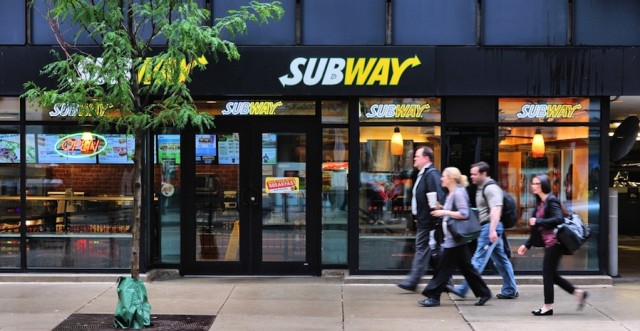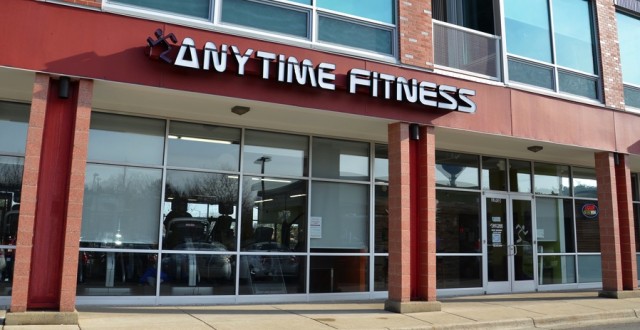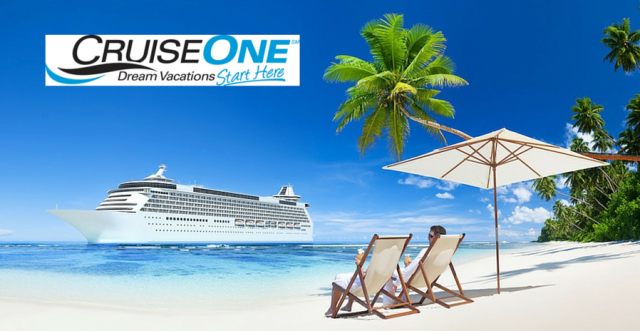Franchise: Subway
Franchising Since: 1974
Headquarters: Miami Springs, Fla.
Number of Units: 43,148
About Subway Franchise
Starting from humble beginnings in one of the smallest states in the country – Connecticut – Subway has grown into an international brand, one that appeals to customers across pretty much every demographic there is.
RELATED: TOP 10 FRANCHISES OF 2015
From the beginning, founder Fred DeLuca had a clear vision for the future of the Subway brand. Today, Subway is the world’s largest submarine sandwich chain with an estimated 43,148 units around the world. Subway has become the leading choice for people seeking fresh, delicious, made-to-order sandwiches that the whole family can enjoy.
The Investment
In order to open your own Subway franchise, you’ll have to be prepared to make a significant investment, and Subway demands that its franchisees have a net worth of $80,000 at a minimum. How large the upfront investment is will depend upon the location that you select, with stand-alone locations requiring more capital. At a minimum, approximately $116,000 will be required to open a location, with a $15,000 franchise fee in addition.
Financial Assistance
Subway offers to finance $10,000 of the initial franchise fee under its minority loan program for qualified franchisees purchasing their first franchise at the full franchise fee in the U.S. Subway also offers finance programs for leased space and construction programs through Subway affiliates, and may loan money to franchisees in connection with a Subway restaurant. In addition, Subway may guarantee a loan for a franchisee in connection with a Subway restaurant. Subway offers an equipment leasing program available to all franchisees in the U.S. (not including Puerto Rico, but including Guam), except those who own an existing restaurant that is not in compliance with the Operations Manual. Subway deems the equipment lease to be a true lease and not a financing lease.
Subway may change or eliminate these loan programs and equipment leasing program without any prior notice to franchisees.
Term of Agreement and Renewal
The length of the franchise term is 20 years, with the exception of the School Lunch program with a term of 5 years. The franchise will automatically renew for additional 20-year periods, unless either party chooses not to renew. The renewal term for the School Lunch programs is 5 years. Subway has the right to refuse renewal if the franchisee is not in full compliance.
Breakdown of Costs
The following information is compiled from the Franchise Disclosure Document of Subway (2014). The FDD will provide you with in-depth information regarding the costs and expenses you can plan to incur when developing a Subway franchise.
Initial Franchise/Development Fee: $15,000
Subway offers incentives for franchisees that will be opening locations at government and military sites. In this case, Subway will completely waive the franchise fee for the franchisee. If the franchisee receives government funding to open his or her location, but it is not located on a government or military site, there is a 50 percent discount on the franchise fee available, as well.
Real Property: $2,000 (low) to $12,000 (high)
A lower cost restaurant is one that will require fewer leasehold improvements, less seating, and fewer equipment purchases. Moderate and higher cost restaurants may require extensive interior renovations, extensive seating, and additional equipment. The typical restaurant measures approximately 1,200 square feet, but some restaurants are as small as 300 square feet and others as large as 2,000 square feet.
Leasehold Improvements: $59,500 to $134,500
In limited circumstances, the landlord for the restaurant premises may require that you upgrade the decor of your restaurant in order to lease the premises. This upgrade may increase your leasehold improvement costs by approximately $10,000.
Equipment Lease Security Deposit: $4,500 to $7,500
Optional Security System: $2,000 to $6,000
Freight Charges: $3,500 to $5,800
Outside Signage: $2,000 to $8,000
Opening Inventory: $4,400 to $6,050
Insurance: $1,200 to $5,000
You must purchase the insurance that Subway specifies, which presently includes statutory Workers’ compensation in the minimum amount required by law, and comprehensive liability insurance, including products liability and completed operations coverage in the minimum amount of $2,000,000 per occurrence/$4,000,000 general aggregate.You must also purchase business vehicle coverage, including owned vehicle liability and hired and non-owned vehicle liability insurance, in the amount of $1,000,000.
Supplies: $500 to $1,300
Training Expenses (including travel and lodging): $2,500 to $4,500
All individuals who sign the Franchise Agreement must attend and complete the Worldwide Training program at Subway headquarters to the franchisor’s satisfaction. Classroom work accounts for approximately 62 hours, and franchisees will have approximately 33 hours of on-the-job training at nearby restaurants. Franchisees will be notified when additional courses become required.
Legal and Accounting: $1,000 to $3,500
Opening Advertising: $2,500 to $4,000
All new, transferred, and relocated restaurants must hold a grand opening sale.
Misc. Expenses: $4,000 to $8,000
You must pay the cost of all permits, licenses, registrations, certifications, or other consents required for leasing, constructing, or operating your restaurant. In addition to these expenses, your municipality may assess impact fees on your Subway restaurant location. Impact fees are charged by your municipality against new development projects, such as your restaurant, in an attempt to recover the costs incurred by the municipality in providing the public facilities required to serve the new development. Subway estimates these fees to be between $5,000 and $25,000.
Additional Funds (3 months): $12,000 to $42,000
ESTIMATED TOTAL: $116,600 to $263,150
These figures are estimates in setting up a Subway franchise and operating it for three months. It is possible to exceed costs in any of the areas above.
RELATED: HOW TO BUY A FRANCHISE


